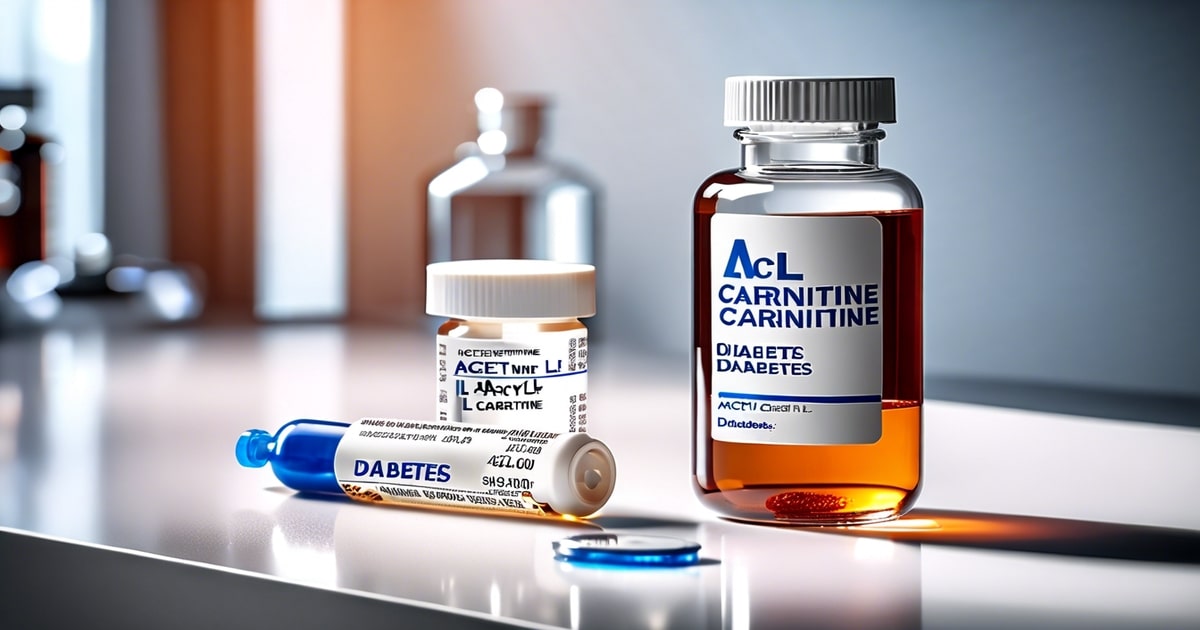Key Takeaways
- Consider Acetyl-l-Carnitine Supplements: Incorporating acetyl-l-carnitine supplements may help improve glucose metabolism and glycemic control in diabetic patients.
- Consult Healthcare Provider: Before starting any new supplement regimen, especially for diabetes management and t2dm, consult a healthcare provider to ensure safety and efficacy.
- Acetyl-l-carnitine shows promise in addressing neuropathic pain symptoms in diabetes mellitus patients, offering a potential avenue for symptom management.
- Monitor Body Mass and Blood Pressure: Regular monitoring of body mass, blood pressure, and diabetes mellitus is crucial when using l-carnitine supplements in diabetic patients to track any changes or effects.
- Be Aware of Safety Considerations: While l-carnitine supplementation can be beneficial, it’s essential to be mindful of safety concerns and considerations, especially regarding dosage and interactions with other medications.
- Holistic Diabetes Management: Combining acetyl-l-carnitine supplementation with a comprehensive diabetes management plan can potentially enhance overall outcomes and well-being for individuals with diabetes.
- Now, on to Acetyl-l-carnitine and diabetes!
Understanding Acetyl-l-Carnitine and Diabetes
Benefits of Acetyl-l-Carnitine for Diabetes
Acetyl-l-carnitine, a natural compound aiding energy production and metabolism, has garnered attention for its potential in managing diabetes. Studies suggest that acetyl-l-carnitine supplementation can enhance insulin sensitivity and improve glucose metabolism in individuals with diabetes. This means it could help regulate blood sugar levels more effectively. Supplementing with acetyl-l-carnitine may assist in better-utilizing glucose for energy production by the body’s cells, potentially leading to improved management of t2dm symptoms. By increasing insulin sensitivity, this compound helps cells absorb sugar from the bloodstream more efficiently.- Improved insulin sensitivity
- Enhanced glucose metabolism
- Better regulation of blood sugar levels
Considerations When Using Acetyl-l-Carnitine
Patients should consult healthcare professionals first when considering acetyl-l-carnitine as a supplement for managing t2dm. They can guide appropriate dosages and any potential interactions with existing medications or conditions for patients undergoing treatment. A balanced diet, regular exercise routine, and insulin supplementation are vital for the holistic management of t2dm.- Consult healthcare providers before starting supplementation.
- Ensure proper dosage based on individual needs.
- Maintain a healthy lifestyle, including diet and exercise routines.
The Role of Carnitine in Glucose Metabolism
Importance of Carnitine in Energy Production
Carnitine is crucial for glucose metabolism as it aids in transporting fatty acids into the mitochondria, where they are converted into energy. This process also helps regulate lipid metabolism by promoting fatty acid oxidation and reducing triglyceride levels. Adequate carnitine levels ensure optimal energy production and metabolic effects. Carnitine supports fatty acid oxidation and enhances insulin sensitivity, facilitating glucose uptake into cells. By improving insulin function, carnitine plays a vital role in maintaining glucose homeostasis, essential for individuals with t2dm to manage their blood sugar levels effectively. For instance, studies have shown that supplementing with acetyl-l-carnitine can improve metabolic profile by increasing glucose utilization and decreasing fat accumulation.Maintaining Optimal Glucose Metabolism
Ensuring adequate carnitine concentration is key to maintaining proper glucose metabolism in t2dm. When carnitine levels are deficient, the body may struggle to efficiently utilize fats for energy production or properly regulate blood sugar levels. Therefore, incorporating foods rich in carnitine or considering supplementation can be beneficial for individuals looking to optimize their metabolic function and overall health.- Pros:
- Enhances insulin sensitivity
- Promotes glucose uptake into cells
- Cons:
- Excessive supplementation may lead to digestive issues
Effects of L-Carnitine on Glycemic Control and Cholesterol

Improved Glycemic Control
Research indicates that l-carnitine supplementation can lower fasting blood sugar levels, improving glycemic control. For individuals with diabetes, this means more stable blood sugar levels throughout the day. This improvement is crucial for managing diabetes effectively. Studies have shown that l-carnitine helps reduce insulin resistance, allowing cells to utilize glucose more efficiently. By enhancing glucose metabolism and insulin sensitivity, l-carnitine maintains healthy blood sugar levels in individuals with diabetes.- Better glycemic control
- Lower fasting blood sugar levels
Positive Impact on Cholesterol Levels
In addition to its effects on blood sugar, l-carnitine also plays a role in improving cholesterol profiles. It has decreased LDL (bad) cholesterol while increasing HDL (good) cholesterol levels. This dual action benefits overall heart health and reduces the risk of cardiovascular complications associated with t2dm. By incorporating l-carnitine into their routine, patients may experience an improvement in their lipid profile by lowering total cholesterol and triglyceride levels while boosting good cholesterol numbers.- Decreased LDL cholesterol
- Increased HDL cholesterol
Oral Acetyl-l-Carnitine Therapy for Insulin Resistance
Potential Benefits
Acetyl-l-carnitine has shown promise in improving insulin sensitivity and reducing insulin resistance, crucial factors in developing type 2 diabetes. Research indicates that oral acetyl-l-carnitine supplementation could enhance glucose utilization in individuals with insulin resistance or prediabetes. This suggests that acetyl-l-carnitine therapy might offer a non-pharmacological approach to managing insulin resistance and potentially preventing the progression of type 2 diabetes.- Improves insulin sensitivity
- Reduces insulin resistance
- Enhances glucose utilization
Clinical Studies
Clinical trials involving patients have explored the efficacy of acetyl-l-carnitine administration as a treatment for conditions related to insulin resistance, such as prediabetes. These studies have indicated positive outcomes, showing improvements in glucose metabolism and insulin function among participants receiving oral acetyl-l-carnitine therapy. For individuals with a history of statin therapy, particularly simvastatin use, acetyl-l-carnitine supplementation may present an alternative or complementary approach to address metabolic issues associated with previous statin use.- Clinical trials demonstrate efficacy.
- Improvements in glucose metabolism observed
- Alternative/complementary approach for those on statin therapy
L-Carnitine as a Dietary Supplement in Type 2 Diabetes
Benefits of Carnitine Supplementation
Carnitine supplementation, like acetyl-l-carnitine, can benefit individuals with type 2 diabetes. Clinical studies suggest that it may enhance insulin sensitivity and improve glucose metabolism. By taking l-carnitine as a dietary supplement, patients with type 2 diabetes might experience better glycemic control. Taking carnitine supplements could potentially lead to improvements in overall health for those managing type 2 diabetes. It is believed that the beneficial effects of carnitine on insulin sensitivity and glucose metabolism could support individuals in their journey toward better management of their condition.Consultation Before Starting Supplementation
Consulting with a healthcare professional is crucial before incorporating any new dietary supplement, especially l-carnitine or statin, into your routine. This step ensures that the supplement is safe for you based on your needs and existing health conditions related to type 2 diabetes.Impact on Body Mass and Blood Pressure in Diabetic Patients
Body Mass Improvement
Some studies propose that acetyl-l-carnitine supplementation could aid in reducing body mass and enhancing body composition among individuals with diabetes. This means it might help individuals with diabetes manage their weight more effectively. For instance, research has shown that diabetic patients who took acetyl-l-carnitine experienced a decrease in body fat percentage over time. Studies suggest that acetyl-l-carnitine may be beneficial for those struggling with weight management alongside their diabetes condition. By incorporating this supplement into their routine, diabetic patients might see improvements in their body mass and overall composition.Positive Impact on Blood Pressure
Moreover, findings indicate that acetyl-l-carnitine can positively influence blood pressure levels, potentially contributing to better cardiovascular health outcomes for individuals with diabetes. This suggests that the supplement may play a role in managing hypertension commonly associated with diabetes complications. Research supports the idea that acetyl-l-carnitine could have favorable effects on blood pressure and cardiovascular risk factors for diabetic patients. By taking this supplement regularly, individuals might experience improved blood pressure control and reduced risks of related complications.Addressing Diabetic Neuropathy with Acetyl-l-Carnitine
Benefits of Acetyl-l-Carnitine for Diabetic Neuropathy
Acetyl-l-carnitine has shown promise in managing diabetic neuropathy symptoms like pain and numbness. It helps by improving nerve function and reducing oxidative stress. Studies suggest that it can enhance nerve conduction velocities in patients, potentially alleviating the discomfort associated with diabetic neuropathy.- Reduces symptoms of diabetic neuropathy
- Improves nerve function and reduces oxidative stress
Future Research on Acetyl-l-Carnitine
While current findings are promising, further research is essential to comprehend how acetyl-l-carnitine precisely impacts neuropathic pain and nerve health in patients with diabetes. Investigating its mechanisms of action will provide valuable insights into its potential as a therapeutic option for diabetic neuropathy sufferers.- Explore mechanisms behind acetyl-l-carnitine’s effects on neuropathic pain.
- Understand its potential as a therapeutic option for diabetic neuropathy
Safety Concerns and Considerations of L-Carnitine Supplementation

Recommended Doses and Safety
L-carnitine supplementation is generally safe when taken as recommended. It’s crucial to follow the suggested doses provided on the supplement labels. When used correctly, carnitine concentrations in the body remain within normal ranges, reducing the risk of adverse events. Taking l-carnitine in excessive amounts can lead to digestive issues like nausea, vomiting, or diarrhea. To avoid these unpleasant side effects, not exceeding the recommended dosage is essential. Always consult a healthcare provider before starting any new supplement regimen, especially if patients have underlying medical conditions or are taking medications that may interact with l-carnitine.Consulting Healthcare Professionals
Before incorporating acetyl-l-carnitine supplements into your routine, consulting a healthcare professional is vital for your safety. This step becomes even more critical for individuals with existing health conditions like diabetes, where managing blood sugar levels is paramount. By seeking guidance from a doctor or pharmacist beforehand, patients can ensure that acetyl-l-carnitine supplementation aligns with their overall health plan.Final Remarks
You’ve delved into the realm of acetyl-l-carnitine and diabetes, uncovering its potential impact on glucose metabolism, glycemic control, and even diabetic neuropathy. The evidence suggests that incorporating L-carnitine into your dietary regimen could offer various benefits for managing diabetes in patients. Always consult your healthcare provider before making significant changes to your treatment plan. As you navigate the vast sea of supplements and treatments for diabetes, keep in mind that knowledge is power. Stay informed, ask questions, and advocate for your health. Your journey with diabetes is unique, so tailor your approach based on what works best for you. Empower yourself with the latest research and expert guidance to make informed decisions that support your well-being.Frequently Asked Questions
Is acetyl-l-carnitine effective in managing diabetes?
Acetyl-l-carnitine shows potential benefits for individuals with diabetes by aiding in glucose metabolism and improving glycemic control. However, individual responses may vary, so consulting a healthcare provider is crucial to determine its suitability for your specific condition and patients.Can L-carnitine help with diabetic neuropathy symptoms?
L-carnitine has been studied for its role in addressing diabetic neuropathy symptoms in patients due to its potential neuroprotective effects. While research suggests some benefits, patients must consult a healthcare professional before using it as a treatment plan.Are there any safety concerns associated with L-carnitine supplementation for diabetics?
While generally considered safe when taken at appropriate doses, some individuals may experience side effects such as gastrointestinal discomfort or allergic reactions. Patients must follow recommended dosages and discuss concerns with a healthcare provider before starting L-carnitine supplementation.What are the potential side effects of Acetyl-L-Carnitine and does it pose any risks for individuals with diabetes?
When it comes to acetyllcarnitine risks and benefits, individuals with diabetes should be cautious. Potential side effects of Acetyl-L-Carnitine may include nausea, vomiting, and an increase in blood sugar levels. It’s essential for individuals with diabetes to speak with a healthcare professional before incorporating this supplement into their routine.

